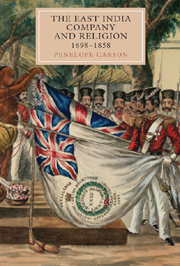Book contents
- Frontmatter
- Contents
- Acknowledgements
- Note on Hinduism
- Abbreviations
- Map of India
- Introduction
- 1 A Christian Company?
- 2 The East India Company, Britain and India 1770–1790
- 3 The 1790s: A Time of Crisis
- 4 The Pillar of Fire Moves Forward: The Advent of British Missionaries 1793–1806
- 5 The Wisdom of the Serpent and the Innocence of the Dove: The Vellore Mutiny and the Pamphlet War 1806–1808
- 6 Troubled Years 1807–1812
- 7 Battle Lines Drawn: Missions, Dissent and the Establishment
- 8 The 1813 Renewal of the Company's Charter: The Religious Public Takes on the Company
- 9 A Turbulent Frontier: The Company and Religion 1814–1828
- 10 A New Dawn? The Era of Lord William Bentinck 1828–1835
- 11 Between Scylla and Charibdis 1836–1858
- Conclusion and Epilogue: Strangers in the Land
- Appendix 1 Presidents of the Board of Control
- Appendix 2 Governors-General and Governors of Madras and Bombay
- Appendix 3 Aide Memoire to Names
- Appendix 4 ‘The Pious Clause’
- Bibliography
- Index
- WORLDS OF THE EAST INDIA COMPANY
Introduction
Published online by Cambridge University Press: 05 February 2013
- Frontmatter
- Contents
- Acknowledgements
- Note on Hinduism
- Abbreviations
- Map of India
- Introduction
- 1 A Christian Company?
- 2 The East India Company, Britain and India 1770–1790
- 3 The 1790s: A Time of Crisis
- 4 The Pillar of Fire Moves Forward: The Advent of British Missionaries 1793–1806
- 5 The Wisdom of the Serpent and the Innocence of the Dove: The Vellore Mutiny and the Pamphlet War 1806–1808
- 6 Troubled Years 1807–1812
- 7 Battle Lines Drawn: Missions, Dissent and the Establishment
- 8 The 1813 Renewal of the Company's Charter: The Religious Public Takes on the Company
- 9 A Turbulent Frontier: The Company and Religion 1814–1828
- 10 A New Dawn? The Era of Lord William Bentinck 1828–1835
- 11 Between Scylla and Charibdis 1836–1858
- Conclusion and Epilogue: Strangers in the Land
- Appendix 1 Presidents of the Board of Control
- Appendix 2 Governors-General and Governors of Madras and Bombay
- Appendix 3 Aide Memoire to Names
- Appendix 4 ‘The Pious Clause’
- Bibliography
- Index
- WORLDS OF THE EAST INDIA COMPANY
Summary
Yesterday the Christians were in the ascendant,
World-seizing, world-bestowing,
The possessors of skill and wisdom,
The possessors of splendour and glory
The possessors of a mighty army.
But what use was that,
Against the sword of the Lord of Fury?
All their wisdom could not save them,
Their schemes became useless,
Their knowledge and science availed them nothing-
The Tilangas of the East have killed them all.
Azad: 24 May 1857THE EAST INDIA COMPANY's worst fears came to gruesome fruition in 1857 when many of the sepoys of its Bengal army mutinied and killed not only their officers but also their wives and children. After two and a half centuries, the Company was about to be ejected from India in ignominy. It was clear that whatever the precise motives were behind the actions of those who rebelled, the Indian Uprising of 1857/8 was for many, at least in part, a war of religion. The British similarly regarded their own brutal retaliation as revenge for the slights to Christianity as well as for the murders of their people. Religious language predominated in the rhetoric of both Britons and Indians.
When the merchant venturers of the English East India Company began to set up factories on the Indian subcontinent from 1600, India was not the united country we have today. The subcontinent was politically fragmented, formed of a myriad of princely states, many of which owed allegiance to the Mughal emperor.
- Type
- Chapter
- Information
- The East India Company and Religion, 1698-1858 , pp. 1 - 6Publisher: Boydell & BrewerPrint publication year: 2012



